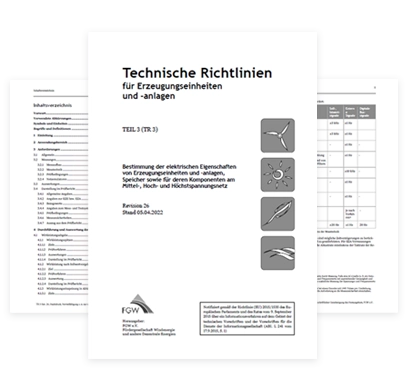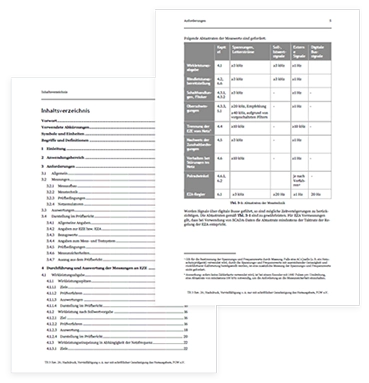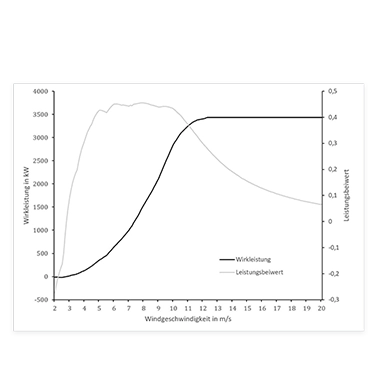Themes
Certification of PGU/PGS
Background of certification of PGU/PGS
Due to certain grid bottlenecks, concerns about grid stability in Germany were the basis for the government to impose legal technical requirements for system services from wind turbines with strict deadlines. The consequences of these requirements are well known and the effects could hardly have been better monitored than in the FGW’s Technical Committee for Electrical Characteristics.
With the publication of the BDEW ‘Guideline for the connection and parallel operation of generation plants on the medium-voltage grid’, technical requirements for feed-in from wind, solar, internal combustion and other energy sources were revised at the voltage level that is decisive for wind energy plants and a certification obligation was introduced for units and plants. In connection with legal requirements from earlier EEG revisions and the System Service Ordinance, a framework of rules was created that introduced the need for common testing and certification regulations for planners, manufacturers, operators, grid operators, measuring institutes and certification bodies. At the same time, the above-mentioned BDEW guideline required mandatory certification for the grid connection and accreditation in accordance with ISO/IEC 17065:2012 (conformity assessment, DIN EN 45011 replaced in 01/2013) for the implementation of these testing tasks by third parties.
Since then, the FGW Technical Committee for Electrical Characteristics has adopted generally recognised testing and certification guidelines for generation units and systems at all voltage levels by broad consensus with the extensive participation of all interested parties and published them for all grid connection rules applied in Germany. This concerns requirements from the above-mentioned BDEW guideline with its four supplements, the SDLWindV, the already published application rules of the FNN, requirements of the EU grid code RFG as well as the Transmission Code 2007 and the VDN guideline ‘EEG generation plants on the high and extra-high voltage grid’.
The FGW test specifications also ensure standardised assessments according to the state of the art and significantly reduce planning and communication costs. The procedures were gradually expanded, first for wind turbines, then for solar inverters, combustion engines (synchronous engines directly coupled) and storage systems.
Process description for obtaining an authorisation for certifiers by the FGW Advisory Board
![]() FGW approval process of a responsible person of a certification body – valid from 03.05.2024, Rev. 6
FGW approval process of a responsible person of a certification body – valid from 03.05.2024, Rev. 6
Please note the FGW data protection regulations when submitting application documents to FGW employees. To safeguard your rights, you can obtain information about the data and request changes and deletions via the email address ‘datenschutz@wind-fgw.de’.
![]() Form to verify the responsible person from 01.03.2023
Form to verify the responsible person from 01.03.2023
![]() Form ‘Minimum scope for the inspection of the equipment certificate’
Form ‘Minimum scope for the inspection of the equipment certificate’
NELEV replaces SDLWindV on 01.07.2017
The ‘Ordinance on the Verification of Electrotechnical Characteristics of Energy Systems’ (NELEV for short) was published in the Federal Law Gazette. From 1 July 2017, the ordinance is intended to regulate proof of compliance with general minimum technical requirements within the meaning of Section 19 EnWG in accordance with Section 49 (4), sentence 1 no. 3 EnWG.
Approval list of responsible persons of a certification body for issuing equipment and system certificates and declarations of conformity
![]() FGW authorisation of responsible employees of certification bodies (as of 12/12/2025)
FGW authorisation of responsible employees of certification bodies (as of 12/12/2025)
Guide to Unit Certificate B
![]() Guide to Unit Certificate B, Declaration of Commissioning and Declaration of Conformity (Status: Rev. 2 from 12.12.2023)
Guide to Unit Certificate B, Declaration of Commissioning and Declaration of Conformity (Status: Rev. 2 from 12.12.2023)
Created unit certificates and component certificates
Obligation of customers to co-operate in the certification process
Resolution book of the meeting of the certification bodies
Visit our online shop
Need help?
Do you have questions about our products or need help with other topics?
We are happy to help you from Monday to Friday from 9.00 am to 5.00 pm.




